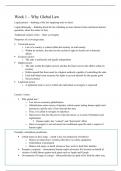Summary
Summary Introduction to Philosophy of Global Law - reading, KC and class notes
- Course
- Institution
This documents includes all relevant information from the readings, knowledge clips and tutorials for the Introduction to Philosophy of Global Law course at Tilburg University for Global Law students. It serves as a foundation for the course and a good preparation for the exam, as it includes d...
[Show more]



